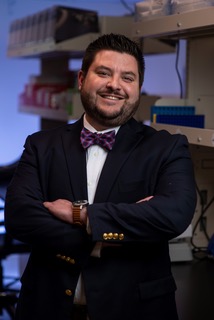March 29, 2022
Office of the Vice President for Research to host Mellott seminar

The Office of the Vice President for Research and K-State Innovation Partners will host A.J. Mellott, co-founder and CEO of Ronawk, for “Orchestrating cell behavior in a novel 3D Modular System” at 10 a.m. Thursday, March 31, in the Mara Conference Center at Trotter Hall. Ronawk is in Olathe and develops a T-Block technology to produce patient-specific biologics to treat diseases, cancer, organ injuries and burns.
A demonstration of the company’s Bio-Blocks, a registered trademark, will follow at 2 p.m. in 121 Ackert Hall.
Interested faculty and graduate students are invited to attend the presentation and/or demonstration. Registration is not required.
Abstract: Mammalian cells have been grown in 2D for nearly 70 years, even though cells naturally grow in 3D inside organisms. The biggest advancements to the Petri dishes have been changing the material from glass to plastic and changing the container from a dish to a flask or well. These advancements, however, still utilize a 2D format. Interestingly, there has been an explosion in biomaterial science and manufacturing over the past 15 years. Scientists can now fabricate unique substrates that introduce microfluidic components, innovative topographies and combine multiple materials together to build “labs on a chip” to study how flow affects cell behavior across a variety of cell types. Yet, before cells are added to these innovative systems, they are still grown in 2D. Why? It’s cheap and easy. However, what if we could utilize the advancements in 3D printing and biomaterial science to start growing cells in 3D earlier? Would this not provide more accurate insights to cell behavior? At Ronawk, we think so. That is why we are working with scientists to modernize the Petri dish and have created Bio-Blocks. We have created a scaffold system that is modular, hydrogel-based, and able to couple together to help scientists grow cells more efficiently and naturally. Our Bio-Blocks have been manufactured to produce higher quality cells for researchers while bypassing the need to subculture, so scientists can spend more time on high-impact experiments rather than growing cells.
If you are interested in meeting with Mellott outside of the presentation and demonstration, please contact Katie Small at ksmall@k-state.edu for one-on-one meetings.
